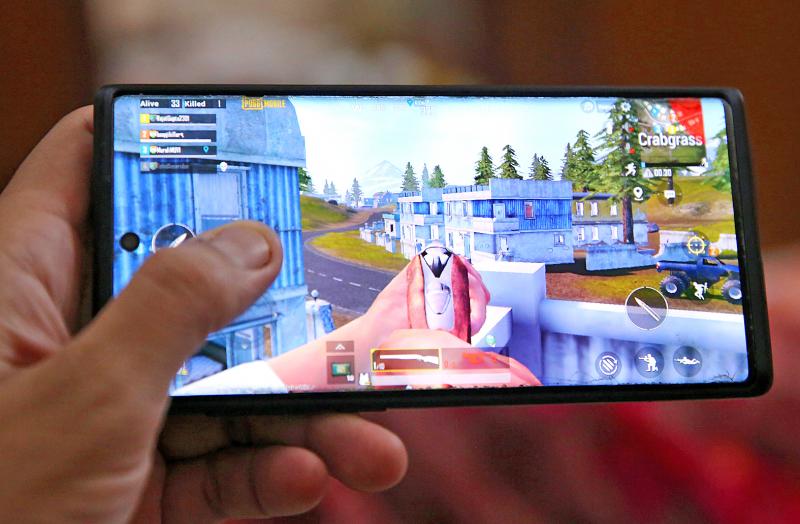India on Wednesday banned 118 Chinese apps, including versions of Tencent Holdings Ltd’s (騰訊) popular game PlayerUnknown’s Battlegrounds (PUBG), search engine leader Baidu Inc and online payments giant Ant Group Co’s (螞蟻集團) Alipay (支付寶), as tensions escalated on the nations’ disputed border.
The apps are “prejudicial to [the] sovereignty and integrity of India,” as well as “security and public order,” the Indian Ministry of Electronics and Information Technology said in a statement.
“This move will safeguard the interests” of Indian mobile and Internet users, it said.

Photo: EPA-EFE
The late evening ban came as India upped the ante in its feud with China after multiple rounds of high-level military talks failed to end the months-long standoff. Indian soldiers claimed strategic outposts, officials with knowledge of the matter said, while the Indian Ministry of Defense said its military was able to stop a push by Chinese troops to breach existing agreements and claim more ground late on Saturday.
“With increasing border tensions, the repeated bans show that India fears data breaches and a real security threat from these apps,” said Anil Kumar, chief executive officer of Bengaluru-headquartered RedSeer Management Consulting Pvt. “The government wants to punish China by pushing back its technology giants.”
Over June and July, India had banned more than 100 Chinese apps, including TikTok, the much-downloaded short video app from ByteDance Inc (字節跳動), and Alibaba Group Holding’s (阿里巴巴) mobile browser, UC Browser.
The move followed mid-June border skirmishes, which killed 20 Indian soldiers and an undisclosed number of Chinese troops.
Since then, India has also changed rules to limit Chinese investments in Indian companies and tightened scrutiny for visas for Chinese businesspeople, academics, industry experts and advocacy groups.
China’s Huawei Technologies Co (華為) and ZTE Corp (中興) are set to be kept out of India’s plans to roll out its 5G networks, people familiar with the matter said last month.
The latest ban’s biggest impact would be felt on the tens of millions of fans of PUBG, which had seen its user numbers rocket in India as COVID-19 lockdowns boosted gaming.
In the Hunger Games-style competition, 100 players face off with automatic weapons until there is only one left standing. Tencent introduced a stripped-down mobile version of the death match, making it among the most popular smartphone games in the world, amassing fans in countries including the US and Russia.
India accounts for more than a quarter of PUBG Mobile’s lifetime installs, though revenues from the country are still minuscule, data from research firm Sensor Tower showed.
Although India is still a small market for these apps by revenues, it offered a large future opportunity, Kumar said.
India has received complaints about the apps “stealing and surreptitiously transmitting users’ data in an unauthorized manner to servers which have locations outside India,” the government said in its statement.

Among the rows of vibrators, rubber torsos and leather harnesses at a Chinese sex toys exhibition in Shanghai this weekend, the beginnings of an artificial intelligence (AI)-driven shift in the industry quietly pulsed. China manufactures about 70 percent of the world’s sex toys, most of it the “hardware” on display at the fair — whether that be technicolor tentacled dildos or hyper-realistic personalized silicone dolls. Yet smart toys have been rising in popularity for some time. Many major European and US brands already offer tech-enhanced products that can enable long-distance love, monitor well-being and even bring people one step closer to

Malaysia’s leader yesterday announced plans to build a massive semiconductor design park, aiming to boost the Southeast Asian nation’s role in the global chip industry. A prominent player in the semiconductor industry for decades, Malaysia accounts for an estimated 13 percent of global back-end manufacturing, according to German tech giant Bosch. Now it wants to go beyond production and emerge as a chip design powerhouse too, Malaysian Prime Minister Anwar Ibrahim said. “I am pleased to announce the largest IC (integrated circuit) Design Park in Southeast Asia, that will house world-class anchor tenants and collaborate with global companies such as Arm [Holdings PLC],”

TRANSFORMATION: Taiwan is now home to the largest Google hardware research and development center outside of the US, thanks to the nation’s economic policies President Tsai Ing-wen (蔡英文) yesterday attended an event marking the opening of Google’s second hardware research and development (R&D) office in Taiwan, which was held at New Taipei City’s Banciao District (板橋). This signals Taiwan’s transformation into the world’s largest Google hardware research and development center outside of the US, validating the nation’s economic policy in the past eight years, she said. The “five plus two” innovative industries policy, “six core strategic industries” initiative and infrastructure projects have grown the national industry and established resilient supply chains that withstood the COVID-19 pandemic, Tsai said. Taiwan has improved investment conditions of the domestic economy

MAJOR BENEFICIARY: The company benefits from TSMC’s advanced packaging scarcity, given robust demand for Nvidia AI chips, analysts said ASE Technology Holding Co (ASE, 日月光投控), the world’s biggest chip packaging and testing service provider, yesterday said it is raising its equipment capital expenditure budget by 10 percent this year to expand leading-edge and advanced packing and testing capacity amid strong artificial intelligence (AI) and high-performance computing chip demand. This is on top of the 40 to 50 percent annual increase in its capital spending budget to more than the US$1.7 billion to announced in February. About half of the equipment capital expenditure would be spent on leading-edge and advanced packaging and testing technology, the company said. ASE is considered by analysts